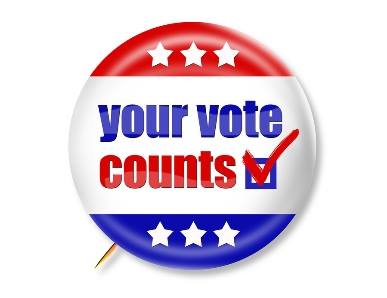Recently, RespectAbility (a national, disability-focused nonprofit) collaborated with major political pollsters to ask questions of likely 2014 voters in battle-ground states (states whose choice of U.S. Senate candidates in the November elections is uncertain and thus will determine the balance of power in the Senate). The poll results clearly indicate that candidates must consider disability issues in the upcoming elections!
The poll found that 56 percent of likely voters in the battleground states identified as disabled and/or had a close friend or family member with a disability. This held true for both younger and older voters (60 percent of voters under 50 and 55 percent of voters over 50). Likewise, the percentage is consistent across party lines (56 percent of Democrats, 58 percent of independents, and 56 percent of Republicans).
Only 28 percent of voters reported feeling that their state government was “doing enough,” and only 35 percent of voters reported feeling that the federal government was doing enough to help with employment for people with disabilities. In electing a U.S Senator, 49 percent of likely voters said they would be more likely to vote for a candidate who prioritized jobs and independence for persons with disabilities (25 percent said “much more likely,” and only 5 percent said they would be less likely). Additionally, the issue of employment for people with disabilities appears to be critical among the following so-called “swing voters”:
- independent voters (41 percent more likely to vote for a candidate who prioritizes employment for people with disabilities, 6 percent less likely),
- independent women voters (45 percent, 5 percent),
- married women voters (51 percent, 4 percent),
- non-college educated women voters (57 percent, 5 percent), and
- suburban voters (53 percent, 8 percent).
Despite the reality that many people with disabilities have trouble securing employment, 89 percent of those responding in this poll said it was important to them to do business with companies who did not discriminate against qualified people with disabilities. 98 percent reported that if they were ever in a position to hire someone, they would be willing to hire a qualified person with a disability.
Across Democrats, Republicans, and independents, the majority of all voters were in favor of changing federal laws to increase caps ($1,070 per month in income, $2,000 in total assets) to allow people with disabilities to earn more without risking their benefits. Likewise, those polled responded that they would be more likely to vote for candidates for Senate who favored changing the law and increasing these caps.
Finally, the poll included a question to gauge public support for U.S. ratification of the United Nations Convention on the Rights of Persons with Disabilities (currently ratified in 150 nations). Pollsters shared that “this Treaty encourages the adoption of laws around the world that promote accessibility, equal opportunities and end abuse and discrimination of people with disabilities. The Treaty will not change existing U.S. law or add additional costs to its budget.” Across all political affiliations, the majority of respondents favored U.S. ratification (65 percent in favor, total – 83 percent of Democrats, 61 percent of independents, and 51 percent of Republicans; only 23 percent of all those polled opposed the Treaty – 10 percent of Democrats, 27 percent of independents, 32 percent of Republicans).
The message from this poll is clear: disability issues have the potential to impact not just individual elections, but also the entire national political system, as voters are already participating in early voting and many more will be heading to the polls in November. Whether or not you live in a “battleground state,” we at AFB encourage you to stay engaged with your state and national political process. Be sure to vote, and be sure the candidates in your area know how you feel about disability-related issues. Happy voting!
More about the poll: The poll Disability Issues for Voters in the Senate Battleground was part of a national poll sponsored by National Public Radio. RespectAbility worked with internationally respected pollsters Stan Greenberg, Ph.D., (Democratic, with Quinlan Rosner Research) and Whit Ayes, Ph.D. (Republican, with Northstar Opinion) to add disability-focused questions to their poll of 1,000 likely 2014 voters in the battleground states of Arkansas, Arizona, Colorado, Georgia, Iowa, Kentucky, Louisiana, Michigan, Montana, New Hampshire, North Carolina, and West Virginia. The margin of error in this poll, at the 95 percent confidence interval, is +/- 3.10 percentage points. For example, if the poll found some statistic to be 90 percent among the 1,000 people they asked, then the pollsters are 95 percent confident that if they were able to question every likely voter in the battleground states, the statistic would be between 91.9 percent and 98.1 percent. Learn more about the poll and the results.
Want to stay up to date on policy issues? Subscribe to AFB DirectConnect!
